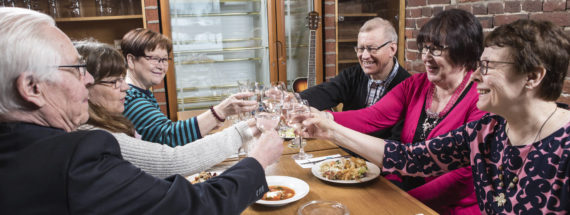Webinar Connecting challenges of healthy aging – food, meals & mealtime situation
Aim of the webinar is to inform about activities of the network, to engage new partners (academy and practitioners)to join the network, and to engage with collaborators for joint application(s), e.g. the future Erasmus+ call in 2023.
Webinar program
- 13.00 Welcome & opening
- 13.20 – 14.10 Two presentations and discussion
- Meals in Nursing homes: The Breakfast Clubs Involvement in food related activities. Lise Justesen, Copenhagen College University, Denmark
- Mealtime situation in nursing homes: Creating caring spaces – development of mealtime interventions in nursing homes. Anna Sandgren, Linnaeus University, Sweden.
- 14.10 – 14.20 Short sum up
- 14.20 – 14. 30 Erasmus+ program – what it offers, Teija Rautiainen, Xamk, Finland
- 14.30-15.20 Two presentations and discussion
- Development of healthy food: Healthy and sustainable plant-based foods for elderly. Mohammed Hefni, Cornelia Witthöft, Linnaeus University, Sweden.
- Elderly and meal knowledge: Meal knowledge among elderly. ai Victor Myrnes-Hansen, UIS, Norway
- 15. 20 Short sum up
- 15.30 Discussion & next steps
If you have not registered to webinar contact teija.rautiainen@xamk.fi
The webinar link will be added here on Tuesday.
Webinar is organized by Bridge builders – Building sustainable nutritional bridges between research and health and wellbeing services for elderly -project.
****************************
The webinar program consist four topics voted most interesting.
Below are all topics,.
- Meals in Nursing homes: The Breakfast Clubs Involvement in food related activities. A study on involvement in food related activity as rehabilitative strategy to contribute to resident’s food-related functionality and quality of life. And as basis for new educational activities targeting Health Care Professional. Lise Justesen, University College Copenhagen, Denmark.
- Educational needs: Need of education in the field of elderly, nutrition and meals. There seems to be a lack of education in the theme of elderly, nutrition, and meals. What we could we do together? Sari Ranta, South Eastern Finland UAS, Finland.
- Educational needs: Education – are there topics missing? What topics do you see as deficient today when it comes to food and meals? Kai Victor Myrnes-Hansen, UIS, Norway.
- Local food environment: Multiform food related services to promote older people’s sense of community and functional capacity. Understanding of the local food environment helps to develop better regional services for older adults. Understanding of the local food environment helps to develop better regional services for older adults. Multisectoral groups are an efficient development tool. Teija Rautiainen, South-Eastern Finland UAS, Finland.
- Development of healthy food: Healthy and sustainable plant-based foods for elderly. There is a lack of attractive, healthy and sustainable snacks and foods for elderly. By incorporation of novel plant ingredients during food processing, will have a positive effect on both, nutrient profile and environment. Mohammed Hefni, Cornelia Witthöft, Linnaeus University, Sweden.
- Mealtime situation in nursing homes: Creating caring spaces – development of mealtime interventions in nursing homes. The mealtime is a key social focal point and occupies a large proportion of activity during a day. The environment is an actor for health, quality of life and wellbeing. To meet the complex needs, it is recommended that mealtime interventions address the entirety of the mealtime environment. Anna Sandgren, Linnaeus University, Sweden.
- Elderly and meal knowledge: Meal knowledge among elderly. How much knowledge do the elderly have about what is the right food to eat at any given time? What stimulates increased food intake, especially among older people? Kai Victor Myrnes-Hansen, UIS, Norway.
More information teija.rautiainen@xamk.fi





